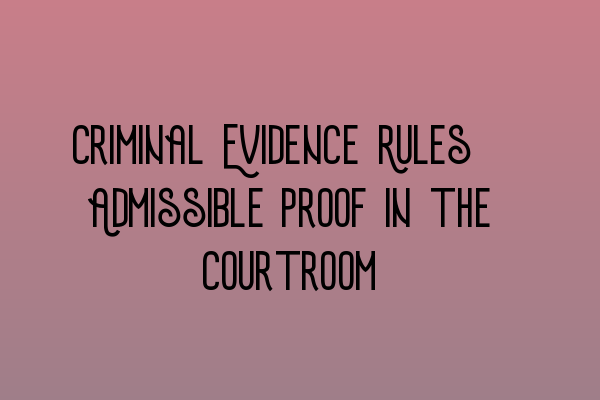Criminal Evidence Rules: Admissible Proof in the Courtroom
Welcome to the SQE Criminal Law & Practice blog! In this post, we will delve into the intricate world of criminal evidence rules and the importance of admissible proof in the courtroom. As legal professionals, understanding the admissibility of evidence is crucial to building a successful case and ensuring justice is served.
Knowing the Rules: Admissibility in Criminal Trials
In criminal trials, evidentiary rules govern what can be presented as evidence in court. Admissible evidence is information that is legally allowed to be presented before a judge and jury, while inadmissible evidence is not permissible and should be excluded from proceedings.
Properly presenting admissible evidence is vital to ensure a fair trial and maintain the integrity of the criminal justice system. It enables both the prosecution and the defense to present their case effectively and persuasively within the boundaries set by the law.
Types of Admissible Evidence
Admissible evidence can take several forms, including:
- Direct Evidence: This refers to evidence that directly proves a fact without requiring any inferences. It can be testimonial or physical evidence, such as eyewitness accounts, DNA samples, or surveillance footage.
- Circumstantial Evidence: Unlike direct evidence, circumstantial evidence requires an inference to reach a conclusion. It includes facts or circumstances that indirectly prove a fact. For example, finding a suspect’s fingerprints at a crime scene.
- Expert Testimony: Experts in various fields, such as forensic science or psychology, can provide specialized knowledge and opinions relevant to a case. Their testimony is admissible if they are deemed qualified by the court as experts in their respective fields.
While admissible evidence can strengthen a case, it’s important to carefully evaluate its relevance and reliability. The weight given to each piece of evidence is ultimately determined by the trier of fact, whether that be a judge or jury. This is where skilled advocacy and persuasive arguments play a pivotal role.
Challenges to Admissibility: Exclusionary Rules
Not all evidence is automatically admissible in court. There are various exclusionary rules that may bar the admission of evidence, such as:
- Hearsay: Hearsay is an out-of-court statement offered for the truth of the matter asserted. Generally, it is inadmissible unless it falls within an exception. Understanding the intricacies of hearsay exceptions is crucial to ensure the admissibility of statements made outside the courtroom.
- Unlawful Search and Seizure: Evidence obtained through an unlawful search or seizure, in violation of an individual’s constitutional rights, may be deemed inadmissible under the exclusionary rule known as the “fruit of the poisonous tree.”
- Character Evidence: In certain circumstances, evidence of a person’s character or past actions may be inadmissible as it has the potential to unfairly prejudice the jury.
It is essential to maintain a thorough understanding of these exclusionary rules to build a strong case and anticipate any challenges to the admissibility of evidence.
Stay Informed and Prepared
To excel in criminal practice, it is crucial to stay updated with the latest developments in the field. Workshops and seminars on criminal practice can provide valuable insights and expand your expertise. Check out our related article on Workshops and Seminars on Criminal Practice: Expanding Your Expertise to learn more!
Furthermore, mastering MCQ strategies for SQE Criminal Law is essential to conquer the exam and showcase your knowledge. Read our comprehensive guide on Mastering MCQ Strategies for SQE Criminal Law: Conquer the Exam to boost your exam preparation.
Keep yourself updated with the latest updates in UK criminal laws and stay ahead of the game. Visit our article on Updates in UK Criminal Laws: Staying Informed and Prepared to learn more about the recent changes.
In Conclusion
Admissible evidence plays a crucial role in criminal trials, shaping the outcome of cases and ensuring justice is served. By understanding the rules and requirements for admissibility, criminal law practitioners can effectively present their arguments, challenge evidence, and build persuasive cases that stand up in the courtroom.
Stay informed, continue expanding your expertise, and remember to always be prepared. If you’re looking for a realistic exam simulation to test your knowledge, don’t miss our Mock Tests for SQE Criminal Practice: Exam Simulation for Success.
